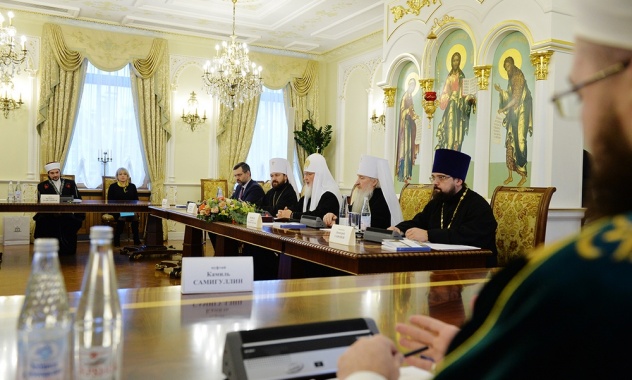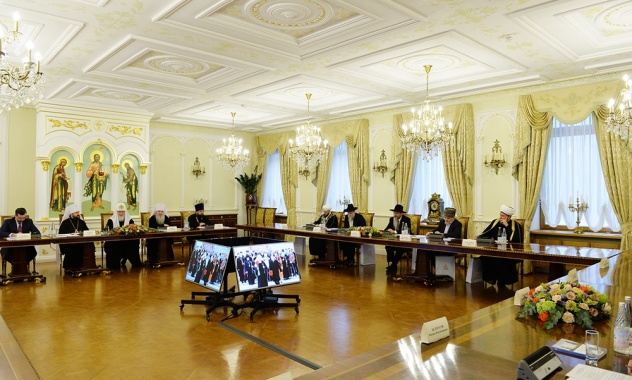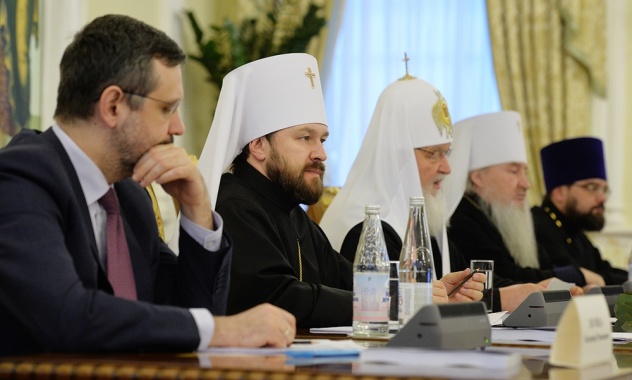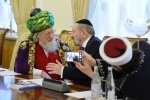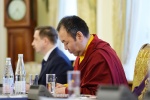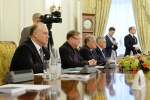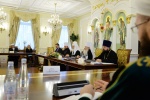His Holiness Patriarch Kirill chairs session of the Presidium of the Interreligious Council of Russia
On 21 February 2017, a session of the Presidium of the Interreligious Council of Russia (IRCR) took place at the Patriarchal and Synodal residence in St. Daniel’s stavropegic monastery.
Taking part in the session chaired by His Holiness Patriarch Kirill of Moscow and All Russia were members of the Presidium Metropolitan Hilarion of Volokolamsk, chairman of the Moscow Patriarchate’s Department for External Church Relations; Sheikh ul-Islam Mufti Talgat Tajuddin, chairman of the Central Directorate Muslims of Russia; Chief Rabbi of Russia Berel Lazar, president of the Federation of Jewish Communities of Russia; Chief Rabbi of Russia Adolf Shayevich, head of the Congress of the Jewish Religious Organizations and Associations in Russia; Rev. Dimitry Safonov, the IRCR executive secretary.
Attending the session on behalf of the Russian Orthodox Church were also Metropolitan Feofan of Kazan and Tatarstan and Mr. Vladimir Legoida, chairman of the Synodal Department for Church’s relations with society and mass media.
The address of His Holiness Patriarch Kirill of Moscow and All Russia delivered at the beginning of the session was followed by the report on the activities of the Interreligious Council of Russia in 2016 presented by Metropolitan Hilarion. He said that a main direction of the Council’s work was the formation of theological education in the country. On 30 May 2016, the Ministry of Education and Science of Russia issues a permit for the establishment of the United Dissertation Council for defending candidate and doctorate theses for specialty ‘Theology”. The Council was established with support of the Ss Cyril and Methodius Theological Institute of Postgraduate Studies, St. Tikhon’s Orthodox Humanitarian University, Moscow State University and the Russian Academy of National Economy and Public Administration under the President of the Russian Federation. On 2 June 2016, members of the Interreligious Council approved the list of candidates recommended by the traditional religious communities to the Expert Council of the Supreme Attestation Commission (SAC) of the Ministry of Education and Science for specialty ‘Theology”. The SAC included all candidates into the Expert Council on August 1.
The DECR chairman is convinced that the development of theological education, thanks to which the youth could get real knowledge of religious traditions, will be an effective instrument for opposing pseudo-religious extremism.
He mentioned the statement ‘On the Protection of Unborn Children” issued by the IRCR on 2 June 2016 and underscored that ‘the protection of traditional family values must remain a priority in the Council’s work.’ He believes that the major task of the Council is peacemaking. For instance, on 6 October 2016, the IRCR issues a statement in response to the letter of the All-Ukrainian Council of Churches and Religious Organizations with an appeal to help the liberation of prisoners in Ukraine. The IRCR said in particular: “Our common history and the rich spiritual, cultural and kindred relationships make us perceive the conflict in Ukraine as our own personal grief.” The document contains an appeal to the conflicting parties to maintain ceasefire and try to settle all difficult matters through dialogue.
The report on the IRCR activities was presented at the international meetings of the OSCE in Warsaw last October and in Vienna last December.
Metropolitan Hilarion presented a collection of articles about interreligious dialogue and its role in opposing persecution of religious minorities in the Middle East and North Africa. The collection was prepared by the Chair of external church relations of the Institute of Postgraduate Studies and is the first published on this problem in our country. “I hope that the collection will make a contribution to interreligious cooperation and protection of religious minorities,” he said.
Rev. Dimitry Safonov presented a new website of the Council, noting that it will not only inform the public about the IRCR work, but also underscore its meaning as the unique forum for dialogue among traditional relations, nations and government bodies and present the experience and special features of interreligious relations in Russia.’











